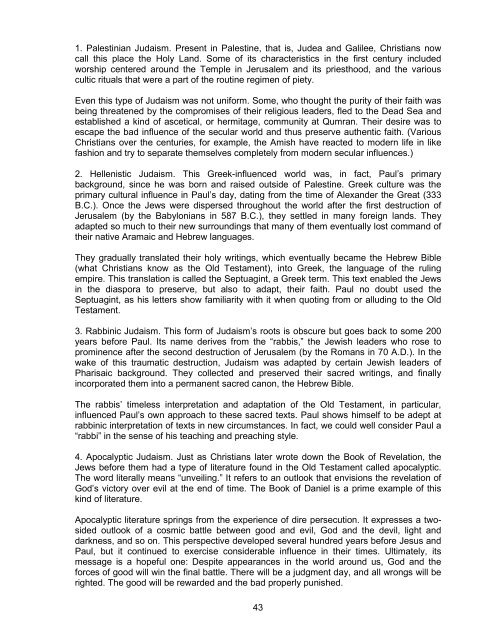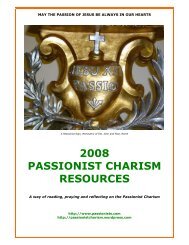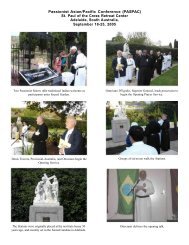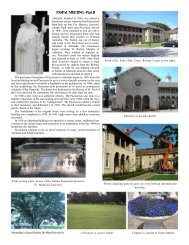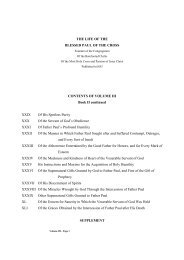2009 PASSIONIST CHARISM RESOURCES - Passionists
2009 PASSIONIST CHARISM RESOURCES - Passionists
2009 PASSIONIST CHARISM RESOURCES - Passionists
Create successful ePaper yourself
Turn your PDF publications into a flip-book with our unique Google optimized e-Paper software.
1. Palestinian Judaism. Present in Palestine, that is, Judea and Galilee, Christians now<br />
call this place the Holy Land. Some of its characteristics in the first century included<br />
worship centered around the Temple in Jerusalem and its priesthood, and the various<br />
cultic rituals that were a part of the routine regimen of piety.<br />
Even this type of Judaism was not uniform. Some, who thought the purity of their faith was<br />
being threatened by the compromises of their religious leaders, fled to the Dead Sea and<br />
established a kind of ascetical, or hermitage, community at Qumran. Their desire was to<br />
escape the bad influence of the secular world and thus preserve authentic faith. (Various<br />
Christians over the centuries, for example, the Amish have reacted to modern life in like<br />
fashion and try to separate themselves completely from modern secular influences.)<br />
2. Hellenistic Judaism. This Greek-influenced world was, in fact, Paul’s primary<br />
background, since he was born and raised outside of Palestine. Greek culture was the<br />
primary cultural influence in Paul’s day, dating from the time of Alexander the Great (333<br />
B.C.). Once the Jews were dispersed throughout the world after the first destruction of<br />
Jerusalem (by the Babylonians in 587 B.C.), they settled in many foreign lands. They<br />
adapted so much to their new surroundings that many of them eventually lost command of<br />
their native Aramaic and Hebrew languages.<br />
They gradually translated their holy writings, which eventually became the Hebrew Bible<br />
(what Christians know as the Old Testament), into Greek, the language of the ruling<br />
empire. This translation is called the Septuagint, a Greek term. This text enabled the Jews<br />
in the diaspora to preserve, but also to adapt, their faith. Paul no doubt used the<br />
Septuagint, as his letters show familiarity with it when quoting from or alluding to the Old<br />
Testament.<br />
3. Rabbinic Judaism. This form of Judaism’s roots is obscure but goes back to some 200<br />
years before Paul. Its name derives from the “rabbis,” the Jewish leaders who rose to<br />
prominence after the second destruction of Jerusalem (by the Romans in 70 A.D.). In the<br />
wake of this traumatic destruction, Judaism was adapted by certain Jewish leaders of<br />
Pharisaic background. They collected and preserved their sacred writings, and finally<br />
incorporated them into a permanent sacred canon, the Hebrew Bible.<br />
The rabbis’ timeless interpretation and adaptation of the Old Testament, in particular,<br />
influenced Paul’s own approach to these sacred texts. Paul shows himself to be adept at<br />
rabbinic interpretation of texts in new circumstances. In fact, we could well consider Paul a<br />
“rabbi” in the sense of his teaching and preaching style.<br />
4. Apocalyptic Judaism. Just as Christians later wrote down the Book of Revelation, the<br />
Jews before them had a type of literature found in the Old Testament called apocalyptic.<br />
The word literally means “unveiling.” It refers to an outlook that envisions the revelation of<br />
God’s victory over evil at the end of time. The Book of Daniel is a prime example of this<br />
kind of literature.<br />
Apocalyptic literature springs from the experience of dire persecution. It expresses a twosided<br />
outlook of a cosmic battle between good and evil, God and the devil, light and<br />
darkness, and so on. This perspective developed several hundred years before Jesus and<br />
Paul, but it continued to exercise considerable influence in their times. Ultimately, its<br />
message is a hopeful one: Despite appearances in the world around us, God and the<br />
forces of good will win the final battle. There will be a judgment day, and all wrongs will be<br />
righted. The good will be rewarded and the bad properly punished.<br />
43


